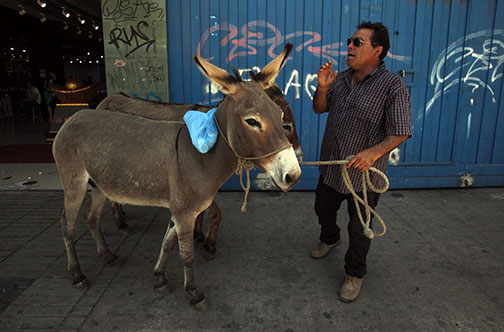Ricardo Alegria holds his donkeys by a leash as he yells to sell their milk in the streets of Santiago, Chile. Alegria, along with his brother Marco, has been selling fresh donkey milk for the past 25 years, and says it’s recommended as a vitamin boost.
SANTIAGO, Chile (AP) — Ricardo Alegria is a different sort of milk man. For a quarter century or more, he and his brother Marco have led donkeys through the streets of Chile’s capital, milking them on the spot for customers.
It’s a rare job, but a very old one. The ancient Greek physician Hippocrates recommended donkey’s milk for some ailments and at least some claim that Cleopatra bathed in it for her skin.
The use of donkey’s milk has persisted in some parts of the world. Even Pope Francis has said he drank it as a boy in Argentina, prompting an Italian company that produces the milk to give him two donkeys recently.
The Alegrias sell shot-sized cups of the milk for about $2. A half-liter, the most they say a donkey produces in a day, goes for about $20.
Ricardo Alegria said the milk “is taken as a vitamin jolt for babies with gastric problems,” and researchers at the University of Camerino in Italy have reported it can be a good substitute for children with allergies to cow’s milk. But adults too often drink it.
Fifty-four-year-old Carlos Aravena said he’s been raising burros on the outskirts of Santiago and selling their milk as long as he can remember. His father did as well.










